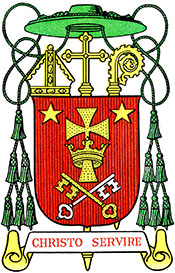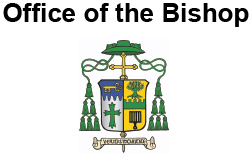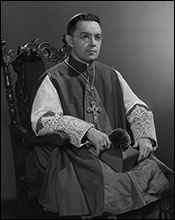Bishop Edward P. McManaman
“To Serve Christ” was Bishop Edward McManaman’s motto, and that he did, even in the midst of great suffering at the end of his life.
Bishop McManaman was appointed as the second auxiliary bishop of Erie in 1948, assisting Bishop Gannon with the administrative tasks of running an increasingly large diocese. He had served previously as the superintendent of schools and rector of the cathedral. Passionate about education, Bishop McManaman was very intelligent, Father Pino said, and knew a little bit about everything. (He can largely be credited with handling the details of Archbishop Gannon’s vision for building the regional high schools and St. Mark Seminary.)
He was a reader and studier and held other priests to those high standards, too. He was also beloved by parishioners at St. Joseph in Oil City, where he served as pastor, and is still held in high regard and sanctified there to this day.
At the time of Bishop McManaman’s appointment as auxiliary bishop, the 13-county-large diocese held confirmations for 200 people at a time at Masses that were two hours long. Bishop McManaman’s and Bishop Gannon’s different strengths—McManaman as the organized administrator, Gannon as the gifted spokesman—complemented each other as leaders of the diocese. The two men had similar personalities, having a wonderful human touch with people. As Bishop McManaman walked outside every night saying his breviary, people would follow him, and he is known not to have let his cassock stop him from joining in a game of baseball with children in the neighborhood.
Bishop McManaman was constantly on the go, often driving between Oil City and Erie to fulfill his various duties. “If he had had a cell phone, he would  have used it,” Father Pino says. Signs of bone cancer slowed Bishop McManaman starting around 1960, although he never let on concerning the intensity of his pain. Most people had no idea he was sick, and shockwaves resonated throughout the diocese when he died of a cerebral hemorrhage on July 18, 1964.
have used it,” Father Pino says. Signs of bone cancer slowed Bishop McManaman starting around 1960, although he never let on concerning the intensity of his pain. Most people had no idea he was sick, and shockwaves resonated throughout the diocese when he died of a cerebral hemorrhage on July 18, 1964.
His flock celebrated his life with two funeral Masses—one at the cathedral and one at St. Joseph Parish in Oil City, where he had served as pastor.


